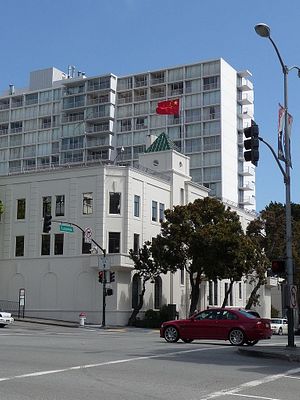The Associated Press reports that a suspect has been arrested for starting a fire at China’s San Francisco consulate. According to the report, Yan Feng, a Chinese national with permanent resident status in the United States, called police to confess to the crime. Feng was arrested at his home in Daly City, California. He appeared in court Monday, where he faced federal charges of arson and damaging foreign government property. No plea has been entered, and Feng’s attorney has made no comment to the media as of yet.
The FBI believes that the case had nothing to do with terrorism, politics, or civil rights. Instead, the case was being investigated as “purely a criminal matter,” according to FBI Special Agent in Charge David Johnson. There are suggestions that the suspect may be suffering from a mental illness. According to an affidavit from FBI agent Michael Eldridge, Feng said that “he targeted the Chinese Consulate because all the voices he had been hearing were in Chinese, and the Chinese Consulate had to have been involved.” Eldridge also noted that Feng’s initial phone confession was made in Mandarin Chinese through an interpreter— it is unclear whether or not Feng speaks English.
Despite the rapid arrest of a suspect, the incident remains a source of unpleasantness in the U.S.-China relationship. The Chinese consulate-general in San Francisco repeated its call for the United States to punish the suspect and “take effective measures to ensure the safety, security and dignity” of Chinese diplomatic personnel in the U.S. Chinese Ministry of Foreign Affairs spokesperson Hua Chunying expressed a similar sentiment, saying that “The Chinese side requires the US side to investigate thoroughly the case and hold the perpetrator accountable. Meanwhile, we urge the US side to take all necessary means to protect Chinese diplomatic and consular missions and staff as well as their property.”
There was no mention in either of these statements of Feng’s Chinese heritage, but that detail had little to do with the official statements being issued. More surprising is that Xinhua’s reporting on the story also neglects to mention that the suspect was a Chinese national. Xinhua instead identifies the man as a permanent resident of the United States. In fact, an initial Chinese language report on Xinhua claimed that the man was an American citizen, but later in the same story amends its language to clarify that Feng is a Chinese citizen holding an American green card. The Wall Street Journal’s China Real Time blog noted that Feng’s Chinese citizenship was reported during a noon news broadcast of China Central Television, sparking some surprised reactions from Chinese netizens.
Meanwhile, a Chinese language report by Hong Kong-based Phoenix News quoted FBI agent David Johnson as saying that Feng was an American citizen with no criminal background. In contrast, Xinhua’s Chinese language report noted only that the San Francisco police chief refused to say whether or not the suspect had a prior criminal record. If Feng has a criminal background, it would reflect more poorly on the U.S. side.
The subtle differences in reporting reflect the “blame game” going on over the incident. Many Chinese news outlets either ignored the man’s Chinese nationality or (mistakenly) identified him as an American citizen. By contrast, the very first sentence of the AP story as well as the New York Times’ Sinosphere blog story identifies the suspect as “a Chinese citizen.” Further confusing the issue, Reuters quoted an FBI spokesman as saying that Feng is believed to be a permanent resident of the United State, but it is still unclear where Feng was born. While the nationality of the suspect doesn’t actually alter any of the salient points of the case, media outlets on both sides seem to be using Feng’s background (as Chinese or American) as a way to imply responsibility for the incident.
Overall, the arson case is a small incident that is unlikely to seriously affect U.S.-China relations, especially now that a suspect has been identified and apprehended. Still, the media coverage in China and the U.S. makes an interesting case study over the ways each side can spin a story.

































